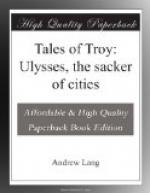But Hector held his hands from fighting, for in the meantime he was making his men face the enemy and form up in line and take breath, and was encouraging them, for they had retreated from the wall of the Greeks across the whole plain, past the hill that was the tomb of Ilus, a king of old, and past the place of the wild fig-tree. Much ado had Hector to rally the Trojans, but he knew that when men do turn again they are hard to beat. So it proved, for when the Trojans had rallied and formed in line, Agamemnon slew a Thracian chief who had come to fight for Troy before King Rhesus came. But the eldest brother of the slain man smote Agamemnon through the arm with his spear, and, though Agamemnon slew him in turn, his wound bled much and he was in great pain, so he leaped into his chariot and was driven back to the ships.
Then Hector gave the word to charge, as a huntsman cries on his hounds against a lion, and he rushed forward at the head of the Trojan line, slaying as he went. Nine chiefs of the Greeks he slew, and fell upon the spearmen and scattered them, as the spray of the waves is scattered by the wandering wind.
Now the ranks of the Greeks were broken, and they would have been driven among their ships and killed without mercy, had not Ulysses and Diomede stood firm in the centre, and slain four Trojan leaders. The Greeks began to come back and face their enemies in line of battle again, though Hector, who had been fighting on the Trojan right, rushed against them. But Diomede took good aim with his spear at the helmet of Hector, and struck it fairly. The spear-point did not go through the helmet, but Hector was stunned and fell; and, when he came to himself, he leaped into his chariot, and his squire drove him against the Pylians and Cretans, under Nestor and Idomeneus, who were on the left wing of the Greek army. Then Diomede fought on till Paris, who stood beside the pillar on the hillock that was the tomb of old King Ilus, sent an arrow clean through his foot. Ulysses went and stood in front of Diomede, who sat down, and Ulysses drew the arrow from his foot, and Diomede stepped into his chariot and was driven back to the ships.




